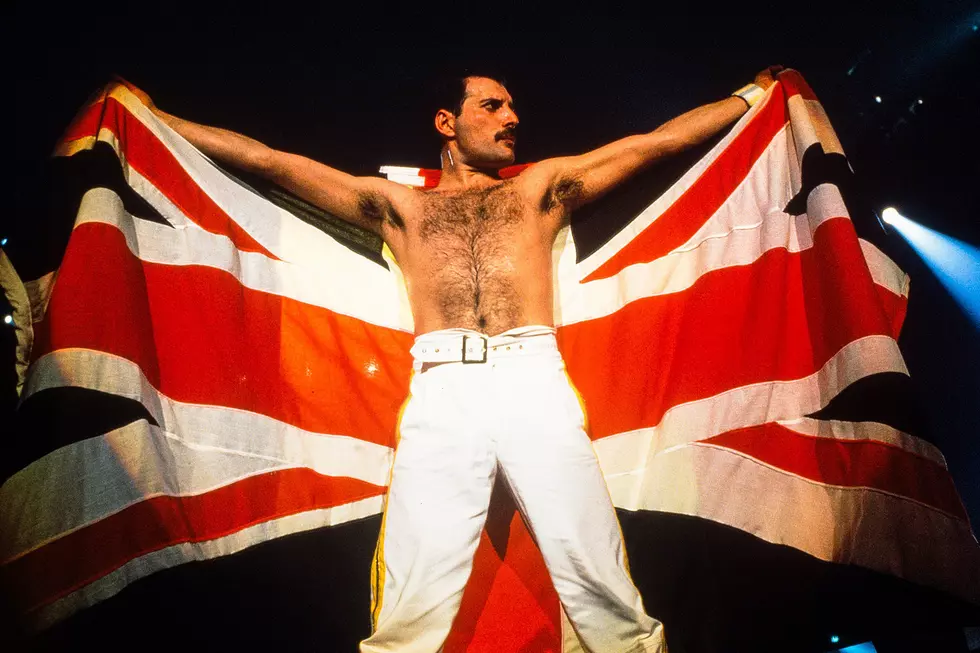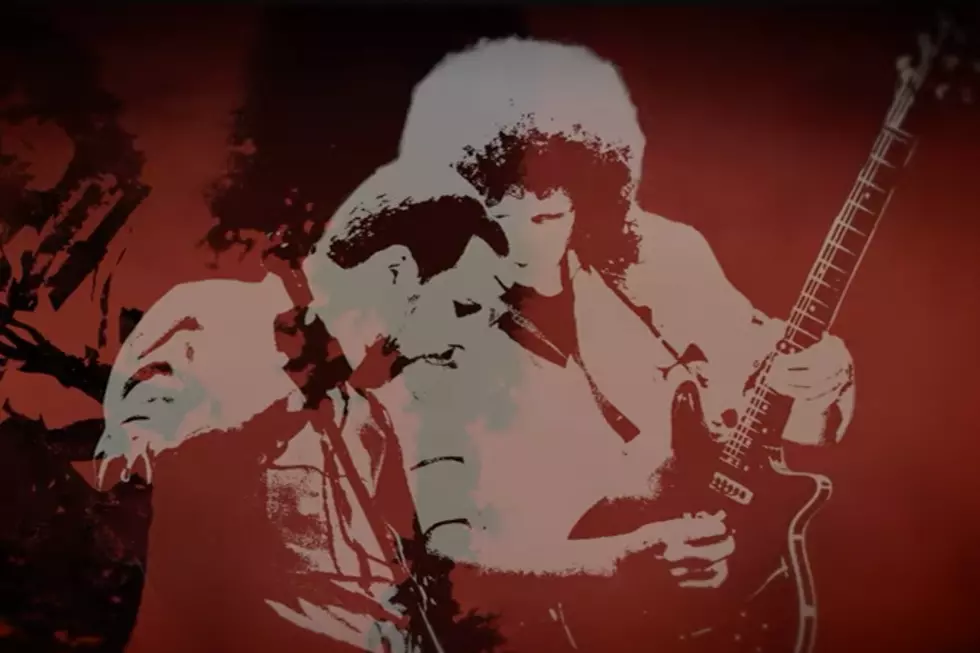
Is Freddie Mercury Rock’s Greatest Frontman?: Roundtable
On Nov. 24, 1991, the world lost one of its most singularly dynamic musical forces: Freddie Mercury.
The singer left behind an impressive legacy, thanks to Queen's extensive catalog and a reputation for unmatched concert performances. Amazingly, Mercury's mystique seems to have only grown since his death, with stage shows, statues and a massive box-office blockbuster all celebrating the artist's work.
As we honor the 30th anniversary of Mercury's death, UCR asked some of its writers to reflect on the singer's legacy, where he ranks among rock's great frontmen and why he remains such a captivating presence three decades after his passing.
Let's get the big question out of the way: Do you think Freddie Mercury is the greatest frontman of all time?
Martin Kielty: Certainly among the best, but different approaches to music require different forms of performance, so I’d never want to choose a definite “best.” In terms of the kind of performer who almost becomes a conductor of a union between musicians and audience, he was very hard to beat, but I’d say Ozzy Osbourne, Axl Rose and Steven Tyler are close. So too was Scottish icon Alex Harvey, a person who really made you feel the entire show was for you – just like Freddie Mercury.
Allison Rapp: It's a bit inherently contradictory, in my opinion, to call any frontman "the greatest" — mainly because I think the thing that makes most frontmen good at what they do is their originality. There is and can only be one Freddie Mercury. If he isn't the greatest, he's certainly a member of that elite top level club alongside Mick Jagger, Robert Plant, David Byrne, Iggy Pop — people who are so alluring and captivating onstage that you have a hard time taking your eyes off them when they're performing.
Ryan Reed: I’m sure one could make a case otherwise, but it seems silly to fight it. Even if you reduced this list to “best singers,” Freddie Mercury has the physical range and technical skill to reach the top. Plus, there are other aspects of being a classic “frontman,” and Mercury has them all: a series of signature looks, a dramatic stage presence, a clear love of the theatrical. Still, this conversation should, at least, also include Peter Gabriel, Robert Plant, Roger Daltrey and Bono.
Corey Irwin: I wish I had been able to witness Mercury's greatness firsthand, because I'm sure it would have been phenomenal. I've spent many nights going down YouTube rabbit holes watching footage of his performances. Words like "dynamic," "electric" and "captivating" get tossed around a lot, but in Mercury's case, he was all those things and more. He was also blessed with arguably the most impressive voice in rock history. Was he the greatest of all time? Jagger, Plant and others may have an argument, but there certainly hasn't been anyone greater.
Bryan Rolli: Choosing the single greatest frontman of all time is a futile effort, but Freddie Mercury certainly belongs in the conversation. Axl Rose and David Lee Roth may have been more kinetic and unpredictable during their primes, and Mick Jagger and Robert Plant's stage moves have become synonymous with the art form itself. But when those guys had a bad night, they were catastrophic. In terms of vocal prowess, stage presence and consistency, Mercury's only rivals are probably Bruce Dickinson, Steven Tyler and James Brown.
What makes Freddie Mercury such an iconic rock figure?
Kielty: His honesty. He lived it, literally, until it hurt. He had a message to impart, and he imparted it by the way he worked to engage and entertain. He gave the impression that he’d built himself a larger-than-life world to live in because he wanted you to do the same. He tried to explain love through music – and, of course, Queen’s musical genius was also a massive part of making Freddie Mercury the icon he became.
Rapp: For one thing, Mercury was consistently willing to push boundaries but never just for the sake of being groundbreaking — he did so with intent and dedication to the craft. But also he gelled really well with his bandmates in a way that can sometimes be difficult to achieve and maintain at that level. An exciting frontman is really not all that interesting if he's not surrounded with support. Being able to bounce ideas back and forth with the other members of Queen, in particular Brian May, meant that Mercury's individuality could shine through in the most effective way possible.
Reed: It’s that combination of skill and stage presence — no one else is on the same planet. But I’d still worship this dude even if he just sat sheepishly onstage. That voice is second to none. (That's before even mentioning his songwriting, piano playing, fashion, etc.)
Irwin: Mercury was the walking epitome of everything rock proclaimed to be. He was wild, unbridled, extravagant and unafraid. I think everyone has a part of themselves that wants to live that life — millions of adoring fans, never-ending parties, the unfiltered confidence to own any room you walk into. Freddie had the guts to do it, completely unapologetic for embracing the world's extremes.
Rolli: Freddie understood that the best rock 'n' roll takes a kernel of truth and blows it up into a wild fiction. He was a master of camp and inhabited a character onstage but not in the cool, detached Alice Cooper way. He created his own mythology without sacrificing his humanity, and eventually the two became inextricable. His vocal range was staggering, but even more impressive was the emotional range he demonstrated switching between songs like "Somebody to Love" and "Dragon Attack" on a dime, or cycling through all the movements of "Bohemian Rhapsody."
Do you think he was was appreciated as he should have been during his lifetime?
Kielty: Always a difficult one. We’re all aware that we often don’t know what we’ve got till it’s gone. I don’t think anyone underestimated Mercury’s value and talent while he was around, but of course he was a function of humanity at the time, and so many other things demanded everyone’s attention. He’s properly elevated now, but when you think of the Queen helicopter flying over that giant crowd, it’s difficult to believe that he was underappreciated, certainly by those who really needed what he brought to us.
Rapp: Up until he died, I'm not totally sure anyone really knew just how impactful his legacy was going to end up becoming. Artists and songwriters now look backward to him and his work to take tips, but at the time I think most people were too busy being dazzled by Mercury to realize he was defining the role of flamboyant frontman in front of everyone's eyes.
Reed: No — at least that’s my perception. It’s still baffling to me that he isn’t consistently ranked as the greatest rock singer of all time.
Irwin: I don't believe so. There's no doubt he was loved by fans the world over, and I'm sure toward the end of his life Mercury knew he'd left a lasting imprint on the world of rock. But Queen never won a Grammy award. Only two singles - "Crazy Little Thing Called Love" and "Another One Bites the Dust" - and one album - 1980's The Game - reached No. 1 on their respective U.S. charts. Mercury was always acclaimed for his high-powered performances, but I don't think people really began realizing just how much he impacted rock until years after his death.
Rolli: Freddie Mercury died three and a half years before I was born, so it's difficult for me to answer this. Judging purely by Queen's latter-day discography, though, I would say no, he wasn't. Part of what made their Live Aid performance so incredible was the fact that they were coming off three consecutive flop albums: Flash Gordon, Hot Space and The Works. Queen had become passe by the mid-'80s, and that made it easier to write off his greatness. Of course, he never lost that greatness — he arguably only got better with age — and every time he hit the stage, he reminded audiences just how brilliant he was.
Aside from the Live Aid performance, what song or classic moment do you feel best encapsulates Mercury’s greatness?
Kielty: The song “Who Wants to Live Forever” does it for me every time – emotionally huge especially given what happened to Freddie Mercury. I also have a favorite story, told by Alan Mair of the Only Ones. He once ran a market stall in London selling custom-made boots to rock stars, and Mercury worked for him (once even fitting David Bowie for a pair of the boots, although sadly no photo exists). Queen had just begun, and they’d booked a large local hall, and all the market staff went along to what was to be the band’s first show. It was terrible – it had nothing going for it at all, and Alan Mair recalls the stallkeepers all going, “Who’s going to tell Freddie?” But Mercury acted as if it had all gone brilliantly; and of course that rock-star fiction was what made it all work. To me it proves he’d always believed and never given up, and I love that.
Rapp: For me, the Mercury songs that resonate the deepest and showcase his talent the best are the slower ballads like "My Melancholy Blues" or "Love of My Life." The sparser arrangements allowed what is probably Mercury's most incredible quality to come through: the sheer range of his vocal. Mercury was always very good at making it look easy, but very few singers of his era — or even now — have that kind of range to their voice. There's also just an undeniable sense of sensitivity (yet, at the same time, strength) in his singing style that is palpable on those quieter ballads.
Reed: I know it’s an obvious choice, but how can you not pick “Bohemian Rhapsody”? He wrote it; it’s one of the greatest rock songs ever recorded; and it’s so definitively Mercury — the massive vocals, the unique blend of classical piano, hard-rock riffs and over-the-top balladry.
Irwin: "The Show Must Go On" is an excellent song on the surface alone, but the story of its creation is what gets me. Mercury knows he's dying and is struggling to muster strength in the studio. Those vocals are difficult enough even for the healthiest man, but Mercury takes a shot of vodka, steps up to the mic and knocks it out of the park. It's like a giant middle finger to unavoidable fate, and I absolutely love it.
Rolli: Remember that scene in Walk Hard when Tim Meadows says, "Dewey Cox has to think about his whole life before he plays"? "The Show Must Go On" is Freddie Mercury's "Dewey Cox" moment. (Actually, chronologically, I guess it'd be the other way around.) The final track off the final Queen album released during his lifetime, "The Show Must Go On" encapsulates all of Mercury's joys and sorrows, his triumphs and defeats. It's a spectacular, gut-wrenching performance that has even more emotional heft when you consider the circumstances of its recording. "I said, 'Fred, I don't know if this is going to be possible to sing,'" Brian May told him. "And he went, 'I'll fucking do it, darling' — vodka down — and went in and killed it, completely lacerated that vocal."
Had he not died, what do you imagine the past 30 years would have been like for Freddie?
Kielty: Probably some ups and downs as music tastes changed. Probably some tabloid dramas as he tried to stick to an approach that others had stopped believing in. Some moments of genius, another solo stint; a period where Queen sold no albums but remained a massive live draw. And then, like Bowie, a glorious return to the top as the world re-evaluated itself and realized what it had in Freddie Mercury: a world treasure, a chat-show regular, a Vegas resident, a cultural fixture. But only if he’d wanted to be – he might have gone in an entirely different direction, and he’d have made that work, too.
Rapp: Queen always struck me as the kind of band that would have made it through it all, so I would imagine that the Queen records would have kept coming, in addition to perhaps some solo endeavors here and there or collaborations with other acts. (I would have been really interested to see what Mercury could have done serving in the role of producer on others' records.) I also assume he would have been the type to start to expand his range even further – maybe try his hand at writing a Broadway musical or get into film scoring — just to explore new avenues. More than anything else, though, I think Mercury would have, in all likelihood, become a really supportive advocate of social-justice causes, particularly as they related to LGBTQ matters. His own personal story was so clearly inspirational to others at the time, I can't envision him not continuing using his platform for the greater good.
Reed: I think he would have made some incredible pop music that experimented with the form. I picture him dabbling a lot with modern electronica and sampling, but I could also see him making an orchestral album. I definitely can’t imagine him just twiddling his thumbs and rewriting the same songs over and over again.
Irwin: I think he would have gone on touring and performing with Queen, adding in the occasional voyage into solo work. But I also imagine, at some point, he would have walked away from it all. Mercury was a perfectionist but also self-aware. He held himself to a high standard, and if that started to slip - due to his wild lifestyle or simply getting older - I think he would have thrown in the towel rather than trying to wring out some nostalgia dollars over the course of a decade. That's not to say he would have disappeared from the public eye. I imagine he would have embraced philanthropic work, especially within the LGBTQ community. And maybe those types of events, fundraisers for noble causes, would be the rare occasions he'd return to the stage - just a few songs belted out by that incredible voice, serving as a reminder of his greatness.
Rolli: The late-'90s and early '00s probably would not have been kind to Queen. (I simply cannot fathom a universe in which Freddie Mercury and Limp Bizkit coexist.) But they likely would have weathered the storm and remained a huge concert draw, leading to their inevitable critical reappraisal, possibly followed by one last career-defining — or at least very respectable — album. Outside the band, I could see Mercury getting more involved in philanthropy and LGBTQ advocacy, as well as other artistic endeavors such as Broadway, production and, hell, maybe even painting, because why not? I would also relish the opportunity to hear a cranky, septuagenarian Freddie Mercury take shots in the press at homophobic, outrage-baiting politicians who would probably appropriate "We Are the Champions" at campaign rallies.
Queen Albums Ranked
More From WZOZ









